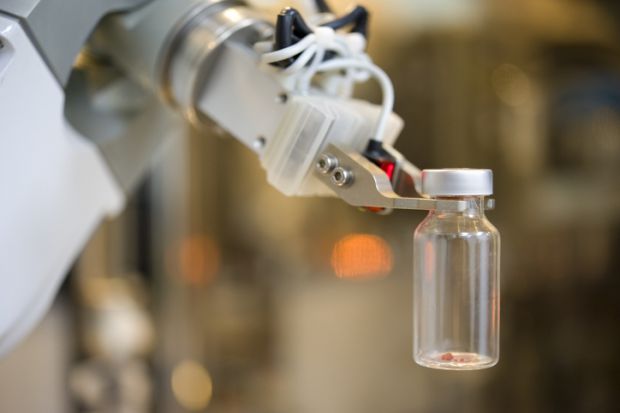Researchers have succeeded in designing an artificial intelligence system that can plan and carry out its own chemistry experiments in a development they said would help scientists make discoveries faster and overcome skills shortages.
Coscientist was developed by a team at Carnegie Mellon University. It uses large language models (LLMs) to plan experiments that are then executed by robotic instruments, allowing a person working with the system to design and run an experiment more quickly, accurately and efficiently than when working alone, the institution said.
A study, published in Nature on 20 December, reports that Coscientist has been able to autonomously learn about complex chemical reactions and design a successful laboratory procedure to make them – the first time a non-organic intelligent system has designed, planned and executed such an experiment.
“We anticipate that intelligent agent systems for autonomous scientific experimentation will bring tremendous discoveries, unforeseen therapies and new materials. While we cannot predict what those discoveries will be, we hope to see a new way of conducting research given by the synergetic partnership between humans and machines,” the paper says.
To use the system – which was designed by Gabe Gomes, an assistant professor of chemistry and chemical engineering, and doctoral students Daniil Boiko and Robert MacKnight – scientists can give a simple, plain language prompt and Coscientist will then scour the internet, documentation data and other available sources to select a course of experimentation.
It was also able to correct errors without being prompted to do so by the scientists, which has raised hopes that it could help to improve the replicability and reliability of experimental results.
Dr Gomes said the use of LLMs – such as GPT-4 – “will help us overcome one of the most significant barriers for using automated labs: the ability to code”.
Allowing scientists to interact with automated platforms using regular language would “open up the field to many more people”, he said, among them academic researchers who often lack access to the advanced scientific research equipment typically found only at top-tier universities and institutions.
As the system can run autonomously in search of new phenomena, reactions and ideas – unlike humans, who need to sleep – Coscientist could help bridge the gap between the untold discoveries waiting to be found and the fact that trained scientists are in short supply, Dr Gomes said.
David Berkowitz, chemistry division director for the National Science Foundation, which funded the work, said the team had created a “hyper-efficient lab partner” that can be “used for genuinely useful scientific purposes”.
Register to continue
Why register?
- Registration is free and only takes a moment
- Once registered, you can read 3 articles a month
- Sign up for our newsletter
Subscribe
Or subscribe for unlimited access to:
- Unlimited access to news, views, insights & reviews
- Digital editions
- Digital access to THE’s university and college rankings analysis
Already registered or a current subscriber? Login







